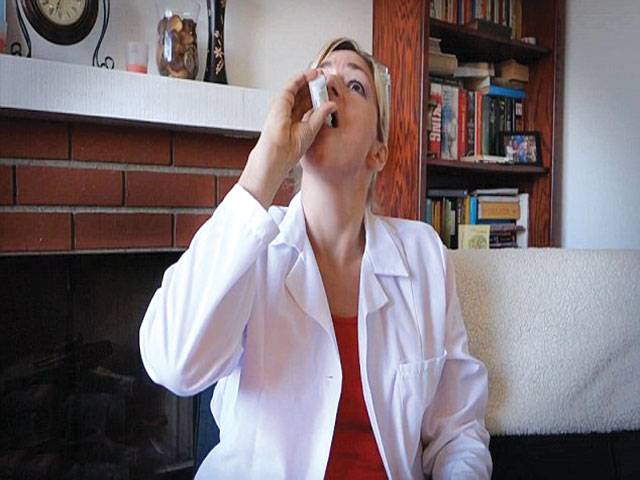DM
London
Homeopathy has long been slated as witchcraft, due to the lack of proper scientific evidence that it works.
Now, one scientist has taken matters into her own hands to prove the point.
Yvette d’Entremont, a forensic chemist from southern California, filmed herself downing 50 homeopathic sleeping tablets in one go to prove they were nothing but ‘sugar pills’ with no active ingredients.
Ninety minutes later, she reported feeling no different - and says this proves thousands of people the world over are being misled.
Her experiment was part of her campaign to stop national pharmacy retailers in the U.S. selling homeopathic products, which, as she puts it ‘have no medicine’ in them.
Ms d’Entremont, who goes under the alias Science Babe, wrote in a recent blog: ‘[The theory is] that diluting a substance makes it more powerful. By this line of thinking, the dilutions continue in succession several times.
‘In the homeopathic remedies that are sold over the counter, they dilute the medications to the point where there is no measurable dose of the alleged active ingredient.
To prove her point, she opens a bottle containing 50 homeopathic sleeping pills and begins to take the whole bottle, washing handfuls of pills down with Diet Coke.
‘There is more actual drug in the caffeine in the Coke I’m drinking,’ she adds.
To test the theory that homeopathic pills are purely a ‘sugar pill’, she even crunches one to see. ‘It does taste like sugar - it’s delightful,’ she says.
However she urges caution on repeating her experiment at home. ‘I really know how to read these labels so I can tell these pills have no medicine in them.
‘Never try this with anything like melatonin or Benadryl.’
Fast forward 45 and then 90 minutes and how is she feeling? Exactly the same - and ‘not even slightly drowsy’.
Ms d’Entremont has now started a petition on Change.org calling for national chains to stop selling selling homeopathic medicine. It states: ‘People will still buy products from your stores, but instead they’ll buy products that actually work with proven claims.’
But both the British Medical Association and the UK Government’s science and technology committee say the NHS should stop funding homeopathic treatments because of a lack of evidence they work.
The BMA has described homeopathy as ‘witchcraft’, and last summer the Advertising Standards Authority said homeopaths were putting people’s lives at risk by discouraging them from seeking medical treatment.
And earlier this year, an Australian study concluded that homeopathy was no more effective than placebo.
Australia’s National Health and Medical Research Council analysed research into the effectiveness of alternative medicines on 68 health conditions and found ‘there is no reliable evidence that homeopathy is effective’ on any of them.
The review, conducted by a working committee of medical experts, said homeopathy had no impact on a range of conditions including asthma, arthritis, sleep disturbances, cold and flu, chronic fatigue syndrome, eczema, cholera, burns, malaria and heroin addiction.
The authors of the report said: ‘No good-quality, well-designed studies with enough participants for a meaningful result reported either that homeopathy caused greater health improvements than a substance with no effect on the health condition [placebo], or that homeopathy caused health improvements equal to those of another treatment.’
They went on to dismiss anecdotal support for the effectiveness of homeopathy, and urged health professionals to take account of scientific evidence when informing patients.
‘It is not possible to tell whether a health treatment is effective or not simply by considering individuals’ experiences or healthcare practitioners’ beliefs,’ they said.
Homeopathy is a complementary medicine, the central principle of which is that ‘like cures like’ – that a substance that causes certain symptoms can also help to remove them in tiny doses.
In England there are several NHS homeopathic hospitals and some GP practices offer the treatment but it is not widely available.
The report prompted medical professionals to call for governments to stop legitimising homeopathy.
Professor John Dwyer, an immunologist and emeritus professor of medicine at the University of New South Wales, told Guardian Australia the report was long overdue and said homeopathic treatments should now be ‘put away’ once and for all.
He said: ‘Obviously we understand the placebo effect. We know that many people have illnesses that are short lived by its very nature and their bodies will cure them, so it’s very easy for people to fall in trap that because they did A, B follows.’
He added he did not think it ethical to prescribe a placebo.
Friday, November 22, 2024
‘This proves homeopathy doesn’t work’

9:58 AM | November 20, 2024
FIFA World Cup 2026 launches first-ever hospitality deposit programme for fans
12:02 AM | November 22, 2024
Zimbabwe govt partners with T Ten Global
12:01 AM | November 22, 2024
Abu Dhabi T10’s biggest season kicks off with record-breaking lineup
11:12 PM | November 21, 2024
Punjab's hockey, Kabaddi, weightlifting teams selected for Quaid-e-Azam Games
11:11 PM | November 21, 2024
Punjab eases smog restrictions
10:09 PM | November 21, 2024
-
Hunger crisis to increase in South Sudan, warns UN
-
Hunger crisis to increase in South Sudan, warns UN
-
Pakistan’s judiciary champions climate justice at COP29 in Baku
-
Punjab struggles with persistent smog as Met Office forecast rainfall
-
Punjab residents face escalating smog crisis as pollution levels soar across country
-
Qatar says Hamas 'no longer welcome' in Gulf state
Land of Vigilantes
November 21, 2024
United in Genocide
November 21, 2024
Finally Fighting Back
November 21, 2024
Digital Stagnation
November 20, 2024
Xi’s Red Lines
November 20, 2024
Independent Supreme Court
November 21, 2024
Fat Loss Fantasy
November 21, 2024
Tackle Corruption Within School Boards
November 20, 2024
To Be Opportunistic
November 20, 2024
Democratic Backsliding
November 20, 2024
ePaper - Nawaiwaqt
Nawaiwaqt Group | Copyright © 2024





